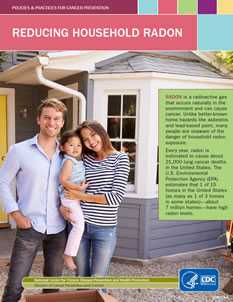What States Can Do About Radon
States play a vital role in protecting the public from harmful environmental exposures, including household radon. The following state practices show promise in reducing household exposures to radon, and ultimately lung cancer deaths.
Monitoring the effect of state-based radon policies is vital to establishing best practices and helping states develop policies if they do not already have radon-specific laws. CDC’s guidelines for program evaluation provide a framework for evaluating radon policies and programs.
Radon-Resistant New Construction Codes
Features that reduce household radon levels can be incorporated into new homes by adopting either the American National Standards Institute’s standard, Reducing Radon in New Construction of One & Two Family Dwellings and Townhouses, or appendix F of the International Residential Code. [PDF-258KB] Eleven states require radon-resistant features in new homes. Every home should be tested after occupancy, even if it was built radon-resistant.
State Licensing of Radon Professionals
Reducing home radon levels requires specific knowledge, skills, and equipment. Properly installed radon reduction systems can reduce household radon levels by as much as 99%. Twenty-four states and the District of Columbia require licensing or certification of professionals who test and fix radon levels in homes. All states have a radon program that provides information to the public; states can require licensed radon professionals to report test results to the state radon program. Radon reporting helps states monitor and evaluate radon policies and programs.
Radon Notification to Home Buyers
About 5 million homes are sold in the United States each year. The U.S. Environmental Protection Agency recommends testing all homes for radon before they are sold. As of 2017, 39 states and the District of Columbia had radon-related laws that require testing, mitigation, or disclosure of radon levels in real estate transactions. Separate, well-crafted radon notifications give buyers information about radon risks and steps they can take to protect their family and the value of the home. States that enact notification laws should monitor the effect on home radon testing and mitigation.
Radon Notification to Renters
About one-third of homes in the United States are rented. Four states require landlords to provide tenants with information about radon testing. Maine requires landlords to test residential buildings for radon every 10 years and fix any buildings with high radon levels.
- Page last reviewed: September 25, 2017
- Page last updated: September 25, 2017
- Content source:
- Maintained By:


 ShareCompartir
ShareCompartir
